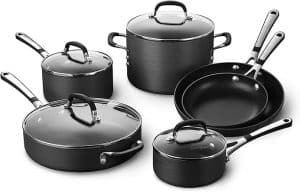Do you own a new set of Calphalon cookware, or perhaps considering investing in one?
It’s easy to find yourself wondering whether it’s safe to use metal utensils with your Calphalon pots and pans. We’ve decided to tackle this question head-on, explaining the do’s and don’ts of cooking with Calphalon.
Understanding Calphalon Cookware
Calphalon cookwares are made from a variety of materials, including stainless steel, hard-anodized aluminum, and non-stick coatings, each created with certain qualities to suit the requirements of various cooking styles.

Take, for instance, the Calphalon Stainless steel cookware is known for its durability and heat distribution capabilities, while the hard-anodized aluminum version is designed to prevent food from sticking.
It’s also important to note how Calphalon cookware is built and produced. They’re typically made using a multi-step process to make sure they can endure the demands of daily use.
Related: Can You Use Metal Utensils on Copper Chef Pans?
Firstly, the raw materials are molded and sculpted into the appropriate shape. The cookware is then put through a series of heat treatments and surface coatings to increase its toughness and efficiency.
A Cookware that is strong and able to tolerate high temperatures, perfect for regular use, becomes the ultimate product.
Generally, Calphalon cookware is a good buy, but are they good with metal utensils?
Can You Use Metal Utensils on Calphalon?
When you’ve invested in a Calphalon cookware set, you naturally want to ensure it’s going to last. It’s more like getting a new car – you don’t just want to drive it off the lot and into a pothole, right?
The same principle applies to your Calphalon pots and pans.
Now, to the question, it depends on the specific type of Calphalon cookware you’re using.
For example, if you have non-stick variants, it’s best to avoid metal utensils. Why, you ask? Metal utensils, due to their hard, sharp edges, can potentially scratch or chip away at the non-stick coating.
Over time, this can lead to a deterioration of the non-stick surface and consequently, a reduction in its performance. However, there is still a list of non-stick cookware that are safe with metal utensils.
But typically, it’s recommended to use utensils made from softer materials like wood, silicone, or nylon. These options are less likely to inflict any damage on your beloved non-stick Calphalon pans.
On the other hand, if you’re using stainless-steel Calphalon cookware, feel free to use them, although still with a little bit of caution.
While they can technically handle the rigors of metal spoons, spatulas, and tongs, they could still be scratched by metal utensils. And to be honest, metal utensils are actually a risk to most cookwares, unless when used properly.
Related: Best Cookwares for Metal Utensils
In a nutshell, the answer is both yes and no, depending on the specific type of Calphalon cookware you have.
Talking about “what type” we’ve created a table that covers the list of calphalon cookwares…
| Calphalon Cookware Type | Metal Utensil Safe? | Additional Comments |
|---|---|---|
| Classic Non-Stick | No | Best to use nylon, coated, or wooden utensils |
| Contemporary Non-Stick | No | Silicone utensils are a great non-scratch choice |
| Signature Non-Stick | No | Avoid sharp-edged utensils to protect non-stick coating |
| Unison Non-Stick | No | Coated utensils can help prolong non-stick surface |
| Elite Non-Stick | No | Using soft utensils helps maintain optimal performance |
| Premier Hard-Anodized Non-Stick | No | Remember to use non-metal utensils even with the durable surface |
| Classic Ceramic Non-Stick | No | Nylon or wooden utensils are ideal to avoid scratches |
| Signature Hard-Anodized | Yes | While metal utensils are okay, still best to avoid sharp edges |
| Premier Stainless Steel | Yes | Can withstand metal utensils, but gentle use is advised |
| AccuCore Stainless Steel | Yes | Metal utensils can be used, but avoid scraping or hard impacts |
| Tri-Ply Stainless Steel | Yes | Fine to use with metal, but gentler utensils can help maintain surface |
| Classic Stainless Steel | Yes | Metal utensil-friendly, but avoid aggressive use |
It’s important to note that these are not a hard and fast rule. You’re still free to do whatever you feel is right.
Also, make sure to understand what’s best for your pots and pans, to ensure they stay in tip-top shape for your culinary adventures. It’s always wise to check the manufacturer’s instructions too!
What Utensils Are Generally Safe for Calphalon Cookware?
While we’re clear that metal isn’t the best buddy for all of Calphalon’s range, so what utensils are a safe bet with Calphalon.
To keep things straightforward, think soft and smooth.
Utensils made of nylon, silicone, or wood are excellent choices for Calphalon’s non-stick range. Why is that? Well, these materials are gentler on the cookware’s surface and are less likely to cause any scratches or damage.
Nylon utensils are quite popular due to their durability and resistance to heat. They won’t melt on your pan while you’re whipping up a delicious stir-fry. Silicone utensils are also a great choice.
They’re known for their high heat resistance, flexibility, and non-scratch properties. Plus, they come in all sorts of fun colors, so you can add a pop of personality to your kitchen!
Don’t forget about good old-fashioned wooden utensils.
They’ve been used for centuries and continue to be a reliable choice. They’re gentle on cookware surfaces, durable, and, let’s face it, there’s something comforting about using a wooden spoon.
Wrapping up
Understanding your Calphalon cookware and how to use it properly is an essential part of maintaining its quality and prolonging its life.
While it may be tempting to use metal utensils for their durability and strength, the key takeaway here is to approach with caution. Stick with softer materials like nylon, silicone, or wood any time possible to keep your cookware in tip-top shape for years to come.






